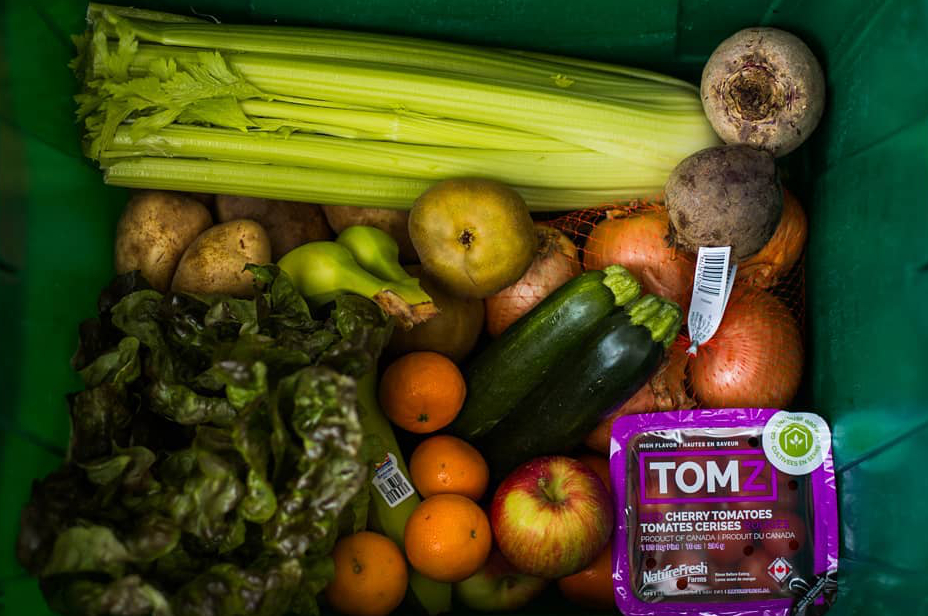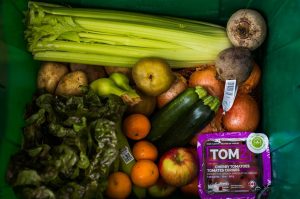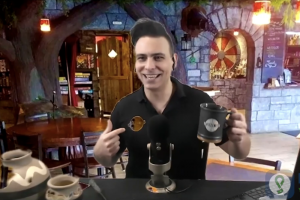00:33 — About The SEED and its programs
02:10 — A much-needed new warehouse location is coming
03:11 — Checking out the new digs
05:13 — How The SEED has pivoted during Covid
07:10 — Looking back during Covid to inform on future cross-program success
10:01 — How to get involved with The SEED
11:03 — Summary
12:41 — How to volunteer via (and a shoutout to) 10C
Click the “Connect” tab to browse web/social/partner links …
Website: www.theseedguelph.ca
Volunteer Form: Click to Fill Out
Facebook: @seedguelph
Instagram: @seedguelph
YouTube: Video Channel
Partner Websites:
Jason Bavington (00:02):
Hey everyone, it’s Jason with DUX — Your Local City Guide and welcome to another episode of our exciting world-famous video blog. I have the pleasure today to be in Guelph Ontario at The SEED. And The SEED is a really amazing local organization that’s been around for a long time and they do a lot of work helping the community with a variety of food insecurity issues. Today we get the pleasure of joining us. Tom Armitage, who’s the Social Enterprise Development Coordinator with The SEED. Welcome Tom.
Tom Armitage (00:32):
Thank you.
Jason Bavington (00:33):
So Tom, tell us a little bit more about The SEED and what the organization has been doing before Covid. Before, you know, the world kind of changed and got thrown on its ear. Just tell us a little bit more about what The SEED has traditionally been up to you and a short summary of the programs that you’ve been working on.
Tom Armitage (00:47):
Sounds good. So The SEED is a project of the Guelph Community Health centre and the reason why The SEED exists in the first place is that food insecurity is a major issue in cities across Canada and in particular here in Guelph and Wellington. So we are running social enterprises that are meant to increase access to healthy food and where people are facing food insecurity. And some of those social enterprises include community food markets where we sell produce on a sliding scale, Good Food Box programs and Good Food distribution where we support area food banks as well. These were things that were all running prior to Covid, but now we’ve had to do a major pivot in our work to ensure that we can get food to people who need it the most. Because all the programs I’ve described require people to come together in a single space to participate, which is obviously something that we can’t do.
Jason Bavington (01:40):
Sure. And as you can see, there’s a group of people behind us. There’s a lot more people behind the camera. The warehouse is very, very busy. There’s lots of food moving back and forth, lots of pallets moving back and forth, lots of boxes being packed behind the camera. So you have a lot of things happening at this location and we can see how the location has gotten quite cramped. Mostly, you know, you kind of from your success and from what you’re able to bring to the community, it has a lot of constraints on your physical location. Now, I understand that you’re moving into a new warehouse shortly. Tell us a little bit about the new warehouse and what it will help you guys accomplish going forward.
Tom Armitage (02:19):
Sure. So yeah, you touched on it there that there is a need for a greater amount of space both from a physical distancing standpoint, but then also from an aggregation of food standpoint. So since we’ve developed this new emergency food home delivery program, we’ve had a lot more donations come in both financially and food-wise that requires storage, that requires breaking down the boxes, requires packing of boxes, all that kind of stuff. So we’ve outgrown this space, which will still be very useful for running our Good Food distribution program, but we need something much larger. So we’ve been fortunate enough to be connected with the Wood family who has a space just down the road from where we are now. It’s 30,000 square feet, four loading docks. It will open up so many opportunities for us
Jason Bavington (03:04):
For sure. Well, shall we go check out the new space?
Tom Armitage (03:06):
Sounds good.
Jason Bavington (03:07):
All right, let’s go check out The SEED’s new digs coming up. We’ll continue there.
Jason Bavington (03:12):
All right. So here we are just down the street from our previous location in that warehouse that was getting kind of cramped and we’re at this new location, this new warehouse. I think it’s gonna work out pretty well for The SEED. I don’t know, Tom, tell me what you think about this new space that you’re in.
Tom Armitage (03:30):
I think it’s fantastic. So we’re so grateful to the Wood family for donating it to the program for the next several months as we really ramp up our program. There’s so much to like about it from a space perspective and from an opportunity perspective where we have four loading docks instead of one, we have 30,000 square feet to work with rather than just a thousand square feet. And then we have the opportunity to install walk in coolers, a walk in freezer. And in the meantime use the loading docks for some temporary cold storage as well. But it’s just so much opportunity here to ramp up our program, which as you saw at the other space we’re getting more and more cramped as the program scales up. So right now the other space we’re supporting 400 households per week where each household has on average about two people. But we’re looking to send out a hundred thousand food baskets from the start the program, which started in April until October of this year.
Tom Armitage (04:30):
So we have our sights set pretty high and obviously that other space just wouldn’t accommodate that kind of growth. So to have a space like this warehouse here is phenomenal because we can run longer pack lines. We pack things into boxes in a staged approach where we have right now six volunteers, but we could have 20, 25 volunteers all in a line and just run things really smoothly that way. Taking into account that we need to have distancing between each of them, we could run pack lines where we’re doing 500 boxes in a day and having that many boxes go out that very same day or over the next couple of days.
Jason Bavington (05:07):
Yeah. Social distancing is one of the many ways that society has had to adapt to the current Covid situation. As of the time of the filming of today’s blog, we’re still deep in Covid-19. Tom why don’t you tell us a little bit more about how The SEED has pivoted your programs and your offerings to the community to assist people during Covid and, you know, what that’s looked like to The SEED both currently and how you envision that going.
Tom Armitage (05:32):
Yeah, so prior to Covid, a lot of our programs, pretty much all our programs, in some way require people to gather together in a single space. So if we were running our food market, for instance, you could picture a farmer’s market kind of scenario where people are all coming to one space, looking at what’s available and choosing what they want to buy and then taking their produce home. But obviously things like that we can’t do safely these days. So that applies to our other programs as well. And each of them were run as social enterprises, meaning that people who are coming to the program are paying something for the food, where the idea is that they’re paying less for food than they would at a grocery store or through other means. So we’re increasing people’s food access as a result of decreasing cost to the participants in our programs.
Tom Armitage (06:22):
And now the two biggest changes with respect to those two things is that our emergency food home delivery program is free to participate within. People just need to identify themselves to say, “Hey, I would love to have a basket of food show up at my doorstep” and it is free of charge. So that’s the biggest change that we’ve had with our programming over the last little while, which is not insignificant because our program is designed in such a way that we want to be less and less reliant on grants over time as our social enterprises scale up and we have more participation. But then this program, given that people aren’t paying for the food, we need to find more donations, more grants that are specific to distributing food and that sort of thing to offset our staff costs, the cost of food, all of that kind of thing.
Jason Bavington (07:09):
Right. So you’ve had this program running for a while now. We saw at the other location there’s a lot of volunteers showing up on a staggered basis, which is great. So they load their cars up with the food boxes, and then you have a route system that they deliver it throughout the community. Now that you’ve had an opportunity to run this program for several weeks, is there anything that, now you have a chance to look back, anything you would change about the program to adapt? Given the experience that you’ve had, any challenges that you had. How do you envision it both continuing as we’re still currently deep in Covid and then in a post-Covid world, how do you see your program transitioning? You mentioned the fact that right now the boxes are free, which at the moment is not sustainable. So, yeah, looking back and then using that to inform going forward, what are your thoughts on that?
Tom Armitage (07:57):
Yeah, so great questions. And those are the types of things that we’re mulling over as the program continues, is looking towards a post-Covid world where people are then, again, able to participate in a paid way is one thing. But even as we’re still practicing physical distancing, we are considering a model where maybe there would be people who are paying for the boxes who still have the means to pay for them. But that’s down the line. And our main focus right now is still on the free delivery of produce to people. It’s not just produce that’s in the baskets, it’s produce dairy, eggs, meat, pre-made meals that are being made by some awesome partners that we have. University of Guelph, The Neighbourhood Group of Companies, YMCA. We have a number of great volunteers who are assisting with coordinating meal creation and delivery and that sort of thing too.
Tom Armitage (08:53):
So the main focus right now is still on the free option, but certainly on our mind, how do we sustain this program over time? And in terms of how we’ve been modifying the program as we’ve been going, as we’ve been learning different things about it, we have fabulous volunteer support through different agencies who have staff who are essentially being paid to stay home. And they’re, they work at agencies where they do social-based work in some way, whether it’s the YMCA, Family and Children’s Services, and a number of others. They’re the type of folks who don’t want to just stay at home when there’s a problem that could have some sort of resolution. So we have great support from those organizations and their staff to help with our pack lines, to help with our deliveries, all that kind of thing. But then there again, it has created a challenge with respect to the ongoing operation of the program, is once those volunteers do go back to work, then we need to make sure that we have volunteers who can take their place so we can sustain the program.
Jason Bavington (10:02):
And so if people want to get involved with The SEED going forward as, you know, we go back to a new normal and as you mentioned, people do get back to work. Your volunteer pool gets reduced, probably by a substantial amount. What are the ways that people can get in touch with The SEED website / social media if they want to volunteer their services to help you guys go forward and help the community as a whole.
Tom Armitage (10:26):
So they could go to the theseedguelph.ca and on that page, much like many websites right now, you can see a banner that says what we’re doing about Covid right now. So there’s a link there that you can click that will take you either to a place where you can fill out the form to have a basket delivered to your house, or there’s volunteer opportunities, as well. So you click that link and then there’s a form to fill out there and we’ll be in touch as soon as we can.
Jason Bavington (10:52):
Okay. And what we’ll do at the bottom of this post, we’ll post all the website links to The SEED website where you can check out the volunteer opportunities there, fill out the form on the page and support The SEED. So in summary, The SEED has been around for a number of years supporting the Guelph Wellington community. In terms of food insecurity during the Covid situation, The SEED transitioned to less of a pay program nominal pay structure to a free structure to donate food boxes to people that are in great need during this time. Because people, you know, for whatever reason they’re off work, they’re not able to get out, not able to get to stores. But you know, everyone still needs food. And what we saw Tom, which I love, at your other warehouse is it’s fresh products, straight from the Food Terminal. You know, like you said Tom,
Jason Bavington (11:41):
it’s amazing, high-quality food packed by University of Guelph catering and you might’ve seen other news interviews related to The SEED and the University of Guelph and the food they’re packing is of amazing quality. It’s highly nutritious and as we saw over there, everything is very, very well organized. As Tom mentioned, the Neighbourhood Group of Companies, with their multiple restaurants in town have also transitioned and pivoted to be an essential partner to The SEED. So it’s great to see everyone coming together, you know, supporting the community in terms of partnerships, which in turn overflows into supporting the greater community as a whole. They have this massive warehouse space, which is not only great for future go-karting purposes and paintballing purposes, but you have all this space to grow. So, yeah, Tom, I celebrate everything that you guys at The SEED are doing to support the community. It’s exciting to see you grow into this new space and I’m confident that you will definitely fill this space with volunteers and keep that goodness going. So yeah, thank you very much Tom.
Tom Armitage (12:41):
And I’m grateful to all the partners that we have, too, that are helping us get to a point where we’re achieving pretty significant outcomes. Another way people can get involved too is through one of our partner agencies, 10C shared space, the Executive Director there Julia Grady is doing phenomenal work to get us different assets, set up a harvest fund as well that we can link to people to, to donate financially to the program. So I just want to make sure that that shoutout gets in there, too.
Jason Bavington (13:10):
Nice. Shoutouts to all sorts of community groups and organizations and businesses in town. That’s fantastic. So yeah, I’m Jason with DUX — Your Local City Guide. If you’re watching this video anywhere else but on our website, head on over to dux.city. Click the blog link there, you’ll find The SEED post, you’ll find this video there, and we’ll post all the links below to The SEED website. We’ll post links to 10C, and you know, all the great shoutouts that happened we’ll put all their links there because it really is a true communal effort. So thank you again, Tom. Tom Armitage Social Enterprise Development Coordinator. I got that right, again, I’m still happy with The SEED. Everyone take care and keep growing and sharing and supporting your local goodness. Cheers.






